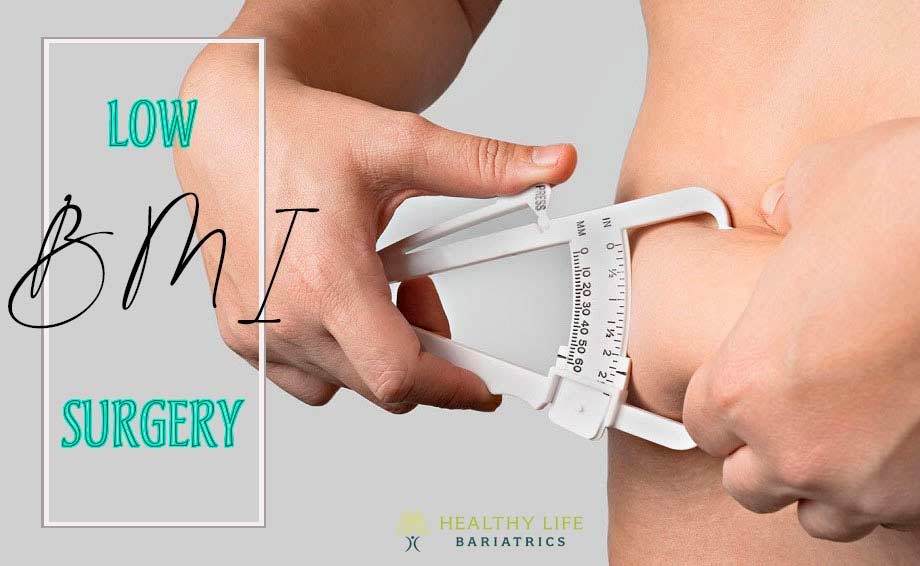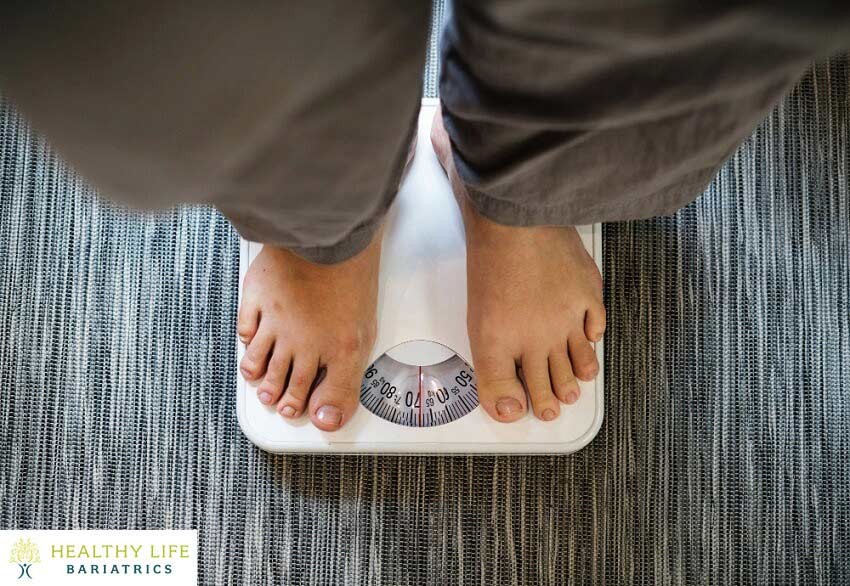
Table of Contents
- Low BMI Surgery Los Angeles - Bariatric Procedures for Patients with 30-35 kg/m2 BMIs
- What is Low BMI Surgery?
- What is the Lowest Body Mass Index (BMI) for Bariatric Surgery?
- Do You Struggle to Lose Weight the Conventional Way?
- What is Metabolic Syndrome?
- How to Treat Metabolic Syndrome?
- Were You Previously Told You Weren't Qualified for Bariatric Surgery? You Might be a Candidate for Surgery Now!
- Insurance Companies and Low BMI Surgery
- "Can I Have Weight Loss Surgery with a BMI of 30 to 35?"
Low BMI Surgery Los Angeles – Bariatric Procedures for Patients with 30-35 kg/m2 BMIs
Bariatric surgery is a medical therapy strategy for weight loss that also gives patients important health benefits.
Up until recently, these weight loss procedures were reserved for those with elevated body mass index scores.
For most people, the best way to qualify forbariatric surger y as a treatment of obesity is to have a BMI of 40 kg/m2 or thirty-five with at least one existing obesity comorbidity.
Obesity comorbidities could include illnesses like type 2 diabetes or one or more cardiovascular diseases.
Those are the recommendations stated by the National Institutes of Health and the American Society for Metabolic and Bariatric Surgery (ASMBS).
Bariatric doctors consider those with elevated BMIs as having morbid obesity. This means they are at least one hundred pounds overweight.
Patients with body mass indexes in the morbidly obese range are most at risk for weight-related medical problems and early death.
The BMI scale is as follows.
18.5 – Underweight
18.5 to 24.9 – Normal
25 to 29.9 – Overweight
30 or Over – Obese
40 or Over – Severely Obese
Bariatric doctors have used BMI for many years to determine the best candidates for weight loss surgery.
These numbers are now changing as doctors learn more about obesity and the ways obese patients react to the effects of bariatric surgery.
Recently, many bariatric doctors have been calling for low BMI surgery. That is, they want more patients to have access to bariatric procedures like the ever-popular gastric sleeve.
What is Low BMI Surgery?

Advancements in bariatric knowledge and technology have made weight loss surgeries safer and more effective than ever.
Surgeons no longer perform the surgeries by opening the patient’s body cavity.
More surgeries today are instead performed laparoscopically. These procedures require small incisions and the use of telescopic tools that allow the surgeon to perform the operation robotically, with extreme precision, and with fewer risks.
Not only is bariatric surgery safe, but we understand obesity a bit better. For instance, the American Society of Metabolic and Bariatric Surgery recently changed its stance with regards to low BMI surgery.
The agency balanced the risks of a surgical procedure like the gastric sleeve and compared them with the risks associated with obesity.
The conclusion was that bariatric surgery was best at protecting the health of weight loss patients.
The ASMB considers those with BMIs in the 30 to 34.9 range as having Class 1 Obesity.
These obesity classifications look like this.
30 to 34.9 Class 1 obesity (low risk)
35 to 39.9 Class 2 obesity (moderate risk)
Over 40 Class 3 obesity (high risk)
In 2012, the agency revised its statements on the role of bariatric surgery on Class 1 patients.
Its position change was reported to have come after inquiries were made to the agency by a collection of doctors, patients, society members, lawmakers, and others, regarding the safety and role of bariatric surgery in protecting the health of those with BMIs in the lower obesity range.
The agency said it made its recommendations after a systematic review of peer-reviewed scientific literature, expert opinions, and other knowledgeable sources.
What is the Lowest Body Mass Index (BMI) for Bariatric Surgery?
The NIH and the ASMBS now feel that procedures like gastric sleeve surgery and gastric bypass surgery should be available for those with BMIs in the 30 to 35 range.
This is good news for anyone with mild obesity who finds it difficult to lose weight, but who previously did not qualify for weight loss surgery.
The research backs up this important policy change.
The results of a randomized trial published in JAMA surgery by scientists at the University of Michigan, the Henry Ford Health System, and Wayne State University found that the odds of bariatric surgery patients achieving a less than 30 BMI within twelve months after surgery were much higher for those who had their operation while still at the below 40 range, marking them morbidly obese.
The other side of the coin showed that only 9% of those with BMIs in the fifty or higher range managed to drop below 30 within their 1-year follow-up.
The results are clear.
Lower BMI patients have better odds of escaping obesity-related ailments and thus would benefit from weight loss surgery.
Those with lower BMIs were also more likely to experience diabetes remission and to stop taking medications for things like blood pressure, blood sugar, and cholesterol following their bariatric procedures.
With such improved metabolic outcomes, low BMI patients are just as deserving of medical treatment as those with severe obesity.
Do You Struggle to Lose Weight the Conventional Way?

When you become overweight or obese, hormones fluctuate. Therefore, you develop metabolic syndrome, which makes it more difficult to burn fat.
Even if you do everything correctly, like eating small, nutritious meals, and exercising as expected, the weight still won’t budge.
Low BMI procedures now make it possible for a greater number of people to achieve the health benefits of bariatric surgery for themselves.
What is Metabolic Syndrome?
Metabolic syndrome represents a series of ailments that can occur when you become overweight and obese.
The illnesses tucked under its umbrella include high blood sugar, high blood pressure, and abnormal cholesterol levels.
Having metabolic syndrome puts you at greater risk of heart attacks and strokes.
How to Treat Metabolic Syndrome?
Bariatric surgery or metabolic surgery like the laparoscopic sleeve gastrectomy (gastric sleeve) and Roux-en-Y gastric bypass surgery have been shown to be effective treatments for many of the symptoms associated with metabolic syndrome.
The right procedure can treat obesity, high blood sugar, high blood pressure, high cholesterol, diabetes, and sleep apnea, simultaneously.
Were You Previously Told You Weren’t Qualified for Bariatric Surgery? You Might be a Candidate for Surgery Now!
Lowering the BMI threshold of bariatric surgery should be good news for anyone in the low-risk obesity range.
Have you ever withdrawn from surgery because your BMI was too low? You might qualify for surgery with these policy changes.
In the past, patients had to increase their BMIs in order to qualify for surgery. It was putting them further at risk.
By hitting the NIH mandated obesity guidelines, surgery for patients with elevated BMIs was more likely to be covered by insurance providers.
Now, even patients with BMIs in the lower ranges may have their procedures covered as health insurers realize the amazing effects of weight loss surgery on those with mild obesity.
Insurance Companies and Low BMI Surgery

Bariatric surgery can cost thousands of dollars, but insurance is available to help cover some or all of the costs.
The good news is that many health insurance companies are now catching on to the medical necessity of low BMI surgery. That’s because medical insurers follow the guidelines of the NIH.
After the reestablishment of the new BMI parameters, you can expect your health insurer to adopt a similar policy.
Check with your individual policy to determine if it covers bariatric surgery. Look for the BMI threshold you need to meet to have surgery performed.
“Can I Have Weight Loss Surgery with a BMI of 30 to 35?”
If you have ever asked the above question, the answer is yes. Now you can have bariatric surgery, even if you have a low BMI.
If you are in the low-risk range of obesity, and you feel bariatric surgery might be right for you, it’s time you discovered the benefits of these life-saving procedures for yourself.
The surgical treatment options recommended for low BMI patients for successful weight loss include the laparoscopic sleeve gastrectomy (gastric sleeve), gastric bypass operation, and gastric banding.
Call Healthy Life Bariatrics to schedule a no-obligation consultation with board-certified bariatric surgeon Dr. Babak Moeinolmolki. During your meeting, you can ask about low BMI surgery for successful weight loss. You can also ask about the risks involved, and information about insurance and financing. The right procedure could change your life for the better. Dial now to have a consultation: 310-861-4093.


